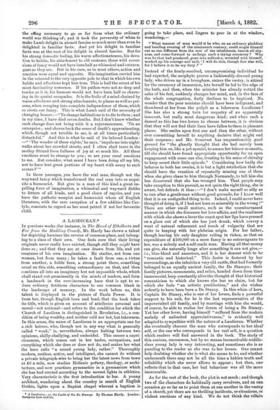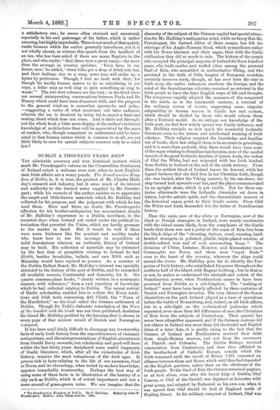A LAODICEAN.*
IN previous works (for instance, in The Hand of Ethelberta and Far from the Madding Crowd), Mr. Hardy has shown a talent for depicting heroines the reverse of common-place, and belong- ing to a class of their own. One feels sure that their living originals never really have existed, though still they might have done so ; and that they are at once drawn from life, and yet creatures of his own imagination. He studies, not from one woman, but from many ; he takes a fault from one, a virtue from another, a foible here, a strong point there, something usual on this side, something extraordinary on that, and then combines all into an imaginary but not impossible whole, which shall stand out prominently in the minds of readers, and form a landmark in the ever-increasing haze that is apt to re- duce ordinary fictitious characters to one common blank in the landscape of memory. In the work before us, this talent is displayed in the picture of Paula Power. It is from her, though English born and bred, that the book takes its title, which is given on account of attributes personal and moral—not national—and refers to the condition for which the Church of Laodicea is distinguished in Revelation, i.e., a con- dition of being wealthy, and neither cold nor hot, but lukewarm. In this sense, the name of Laodicean is an appropriate one for a.rich heiress, who, though not in any way what is generally called " weak," is, nevertheless, always halting between two opinions, shilly-shallying, and undecided. This causes a capri- ciousness, which comes out in her tastes, occupations, and everything which she does or does not do, and makes her what the hero calls "a mixed young lady, rather." Thoroughly modern, restless, active, and intelligent, she cannot do without a private telegraph-wire to bring her the latest news from town at £6 a mile, now studies Hellenic pottery, theology, or archi- tecture, and now practises gymnastics in a gymnasium which she has had erected according to the newest lights in athletics. Very characteristic is the first introduction to her. A young architect, wandering about the country in search of English Gothic, lights upon a Baptist chapel whereat a baptism is
• •
A Laodicean ; or, the COMO of the Do Stomp. By Thaws Hardy. London: Sampson Low and Co. going to take place, and lingers to peer in at the window, wondering,—
"What manner of man would it be who, on an ordinary plodding- and bustling evening of the nineteenth century, could single himself oat as one different from the rest of the inhabitants, banish all shy- ness, and come forward to undergo such a trying ceremony ? Who was he that had pondered, gone into solitudes, wrestled with himself, worked up his courage and said, 'I will do this, though fow else will, for I believe it to be my duty ?' "
Instead of the firmly-resolved, uncompromising individual he had expected, the neophyte proves a fashionably-dressed young lady, who drives up in a brougham, enters the vestry, is attired for the ceremony of immersion, lets herself be led to the edge of the bath, and then, when the minister has already wetted the soles of his feet, suddenly changes her mind, and, in the face of the whole congregation, flatly declines to be baptised. No wonder that the poor minister should have been indignant, and
thundered at her from the pulpit as a lukewarm Laodicean T She has also a strong turn for coquetry of an apparently
innocent, but really most dangerous kind ; and when such a. damsel as this has two lovers to choose between, it is obvious that they will not find their lines have fallen to them in pleasant places. She smiles upon first one and then the other, without ever committing herself to anything decisive that might end. their suspense ; and Mr. Somerset has unquestionably good ground. for " the ghastly thought that she had merely been keeping him on, like a pet spaniel, to amuse her leisure moments,.
till she should have found appropriate opportunity for an open engagement with some one else, trusting to his sense of chivalry to keep secret their little episode." Considering how badly she• behaves to both her swains, it is but a light retribution that she should have the vexation of repeatedly missing one of them
when she gives chase to him through Normandy, to tell him she has discovered that she has wronged him. That people may take exception to this pursuit, as not quite the right thing, she is aware, but defends it thus :—" I don't make myself so silly as to run after a,gentleman without good grounds, for I know well that it is an undignified thing to do. Indeed, I could never have thought of doing it, if I had not been so miserably in the wrong !"
There are other small matters, such as the unembarrassed manner in which she discusses her love-affairs, and the readiness with which she shows a lover the exact spot her lips have pressed on a glass out of which she has just drunk, which convey a want of natural refinement and touch of vulgarity that are quite in keeping with her plebeian origin. For her father,, though leaving his only daughter rolling in riches, so that an expenditure of £100,000 on a mere fancy is no extravagance to her, was a nobody and a self-made man. Having all that money can give, she naturally longs after something it can not give,— i.e., blue-blood and ancestors, and it is her dearest wish to be• " romantic and historical." This desire is fostered by her surroundings, as she inhabits a very old castle, that had formerly belonged to an equally ancient family, the De Staneys ; their family pictures, monuments, and relics, handed down from time immemorial, keep constantly alive the thought of that historical romanticism to which she knows she has no claim, but for which she feels " an artistic predilection," and she wishes ardently to have been born a De Stancy. In this whim of hers,
Captain De Stancy, who is one of her lovers, finds a powerful support to his suit, for he is the last representative of the impoverished old family, and by marriage with him she would„
of course, be able to realise her dream of being a De Stancy_ Yet her other lover, having himself " suffered from the modern malady of unlimited appreciativeness," is evidently well adapted to sympathise with the nature of a, Laodicean. Whether she eventually chooses the man who corresponds to her ideal' self, or the one who corresponds to her real self, is a question which readers will find answered in the book. The study of this curious, uncommon, but by no means inconceivable middle- class young lady is very interesting, and sometimes she is as puzzling to the reader as she was to her lovers. One cannot help doubting whether she is what she seems to be, and whether underneath there may not be all the time a hidden truth and reliability which she never allows to appear ; but then, one reflects that in that case, her bad behaviour was all the more inexcusable.
As for the rest of the book, the plot is not much ; and though. two of the characters do habitually carry revolvers, and on one. occasion go so far as to point them at one another in the vestry of a church,yet there are no thrilling incidents, or situations, or violent emotions of any kind. We do not think the villain a satisfactory one ; he seems often strained and unnatural, especially in his cool patronage of his father, which is rather amusing, but highly improbable. There is not much of that quaint, rustic humour which the author generally introduces, yet it is not wholly absent, as witness this speech from the landlord of an inn, who has been asked if there are many Baptists in the place, and who replies " that there were a great many,—far more than the average in country parishes. ' Even here, in my house, now,' he added, ' when folks get a drop of drink into 'em, and their feelings rise to a song, some man will strike up a hymn by preference. Though, I find no fault with that ; for though 'tis hardly human nature to be so calculating in yer cups, a feller may as well sing to gain something as sing to waste." The two first volumes are the best ; in the third there are several uninteresting conversations between Paula and De Stancy which could have been dispensed with, and the progress to the general wind-up is somewhat spasmodic and jerky, —suggesting a series of what musicians call false cadences, wherein the ear is deceived by being led to expect a final and resting chord which does not come. And is there not through. out the whole book a little more display of the author's technical knowledge of architecture than will be appreciated by the mass of readers, who, though competent to understand and be inter- ested in that human nature which is common to us all, are yet little likely to care for special subjects common only to a select few ?



































 Previous page
Previous page